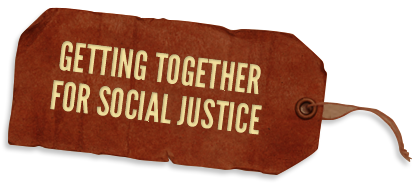The following article is comprised of excerpts from Paul Kivel’s books Uprooting Racism and You Call This a Democracy?
Getting Information1
BECAUSE OF POWER ELITE CONTROL of the media, including textbooks, news sources, “expert” testimony, and academic and scientific research, it is difficult for most of us to have the information we need to make informed choices. However, if we ask a basic question about every policy issue, we can begin to sort out which side we should be on. That basic question is “who benefits more from this, the ruling class or poor and working-class people?” Or, in other words, “who is going to make money and who is going to pay the cost?”
The greatest exploitation in our history has been of the most marginalized groups such as people of color and of women in general. So we also have to ask, “How does this policy affect particular groups such as women, people of color, and low income people?”2
There are many good sources for alternative information and analysis. Some of them are listed in the resources section at the back of my book, You Call This a Democracy?. Many of the websites listed have links to still other sources. We cannot be misled if we think critically about the information we receive from any source, if we compare sources and their class interests, and if we share information about alternatives to a ruling class perspective on current public policy issues.
Questions to Assess Public Policy Issues
Here are some questions to ask yourself when evaluating public policy issues:
1. How is the issue being defined? Who is defining the issue? Who is not part of the discussion?
2. Who is being blamed for the problem? What racial or other fears are being appealed to?
3. What is the core issue?
4. What is the historical context for this issue?
5. What is being proposed as a solution? What would be the actual results of such a proposal? Who would benefit?
6. How would this proposal affect the rich? What would be in their class interests and what would benefit most of the people of the country?
7. How would this proposal affect people of color? How would it affect white people?
8. How would it affect women? Young people? Poor and working people?
9. What are other options for addressing this issue?
10. How are people organizing to address this problem in a more progressive way?
11. What is one thing you could do to support their efforts?
Any public policy issue can be analyzed using these and other questions. They stimulate our critical thinking so we are not misled into colluding with an agenda that benefits a few, and distracts us from the source of our problems.
Questions to Ask Political Candidates
In the current political/economic system just electing good leaders will not change the basic inequalities. But it is important that we elect officials who will challenge those in power, and open doors to community participation and information about how the system works.
It is impossible to tell if political candidates will follow through on what they say during their campaign. There are some clues to use to determine if they are likely to. Below are some questions relating to class which are useful places to start.
a. What is the class background of the candidate?
b. What is their current class and occupation?
c. Who do they profess solidarity with?
d. Who benefits from the policies they advocate?
e. How much do they talk about class?
f. Who finances their campaigns?
g. Have they shown the courage to challenge the ruling class and power elite?
h. Do they have a long-term vision of economic change?
i. Do they make decisions based on the best interests of future generations?
j. Have they shown themselves willing to fight corporate influence and power?
k. Do they listen to and learn from local struggles for economic and social justice?
l. Do they seem to understand and act from an understanding of the interconnections of racism, sexism, and economics?
m. Will they represent the interests of the most disenfranchised groups in the community?
n. Are they willing to work for long-term, structural change in our society?
1 Adapted from You Call This a Democracy?: Who Benefits, Who Pays and Who Really Decides.
2 The following section on doing an analysis of public policy issues is adapted from my book Uprooting Racism.
Please send comments, feedback, resources, and suggestions for distribution to paul@paulkivel.com. Further resources are available at www.paulkivel.com.
All articles may be quoted, adapted, or reprinted only for noncommercial purposes and with an attribution to Paul Kivel, www.paulkivel.com. Creative Commons Attribution – Noncommercial 3.0 United States License. To view a copy of this license, visit here.
